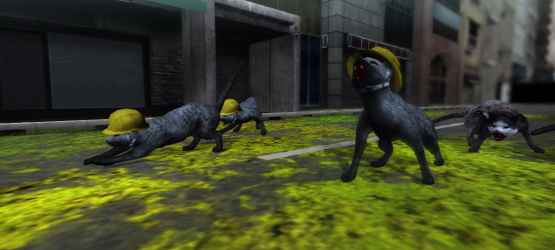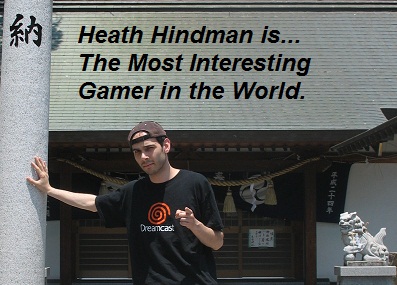He welcomes class warfare, because he's part of the winning class.
He quietly senses irony when people tell him to "rise up."
His machine rages back.
At the end of every year, game websites and magazines write their "Best of" articles, and readers enjoy seeing which game take each category. This year, however, one game stands so far above all others, there is no point to even acting like their is a debate. Tokyo Jungle runs away with this contest, for two main reasons.
Reason #1: Success In Technical Achievements
Tokyo Jungle operates under the theory that "less is more," and when it comes to visual fine tuning, no game has less than Tokyo Jungle. In areas where other developers would be trying to flaunt their big budgets, Tokyo Jungle keeps it real, giving players a look at the graphics of a nonexistent console generation that happened between the Genesis and the Virtual Boy.
It gives gamers a good, up-close look at the very pixels that make the game. Holy shit, did you ever wonder what they looked like under a magnifying glass? Well now you can see, because in most segments of Story Mode, the camera will zoom in close to an animal and show you those big, beautiful pixels. It combines this with some of the most amazing lighting effects of the decade. Have you ever seen a bear stand up with the sun behind him, then look down and see that his shadow is also behind him? You haven't, because that's scientifically impossible. (Let's assume the sun is the only light source in this scenario.)
But Tokyo Jungle proves that games are art by reimagining the way light and shadows work. Sometimes, one dog will be running directly behind another, and the leader will have a shadow on his face while the one behind him somehow has its face lit up by sunlight. That's imagination. That's art. That's Tokyo Jungle.

Reason #2: It's A Game With A Message
Tokyo Jungle makes no attempt to hide its communist agenda—a bold move during American election season. In real nature, the physical differences between one animal and another is tremendous. Tokyo Jungle, meanwhile, makes the playing field level for virtually all creatures. While still true that a lion is more powerful than a house cat, Tokyo Jungle narrows the gap considerably, making that tiny house cat capable of one-hit killing a deer, a mountain goat, or even a gazelle, without any level-ups or equipment necessary. A potbelly pig has the same vertical leap as a black panther in this game. This redistribution of skill is an obvious political statement, and we need to listen.
How can a creature not accustomed to wearing boots "pull [himself] up by [his] bootstraps"? This game gives everyone boots like a true comrade.
Some will say "oh, it's just a video game", and those people need to step the fuck back and open their eyes to the world around them. Every revolution is started by people who weren't given a chance by The Man and may have even been mocked by society at large. The Lamestream Media might mock this game's attempt to start a true change we can believe in, but they will not be remembered as this game will when we look back on our history, 50 years from now. This game is the new Boston Tea Party, a modern Storming of the Bastille, boldy stiffening its arm against the rolling tanks of the corrupt game industry.

The American Sheeple might laugh at this game and its message of hope, but they will be laughing all the way to their graves once the mighty few begin to show their figurative fangs. And literal fangs. Because they have literal fangs.
Take the power back, my friends.







